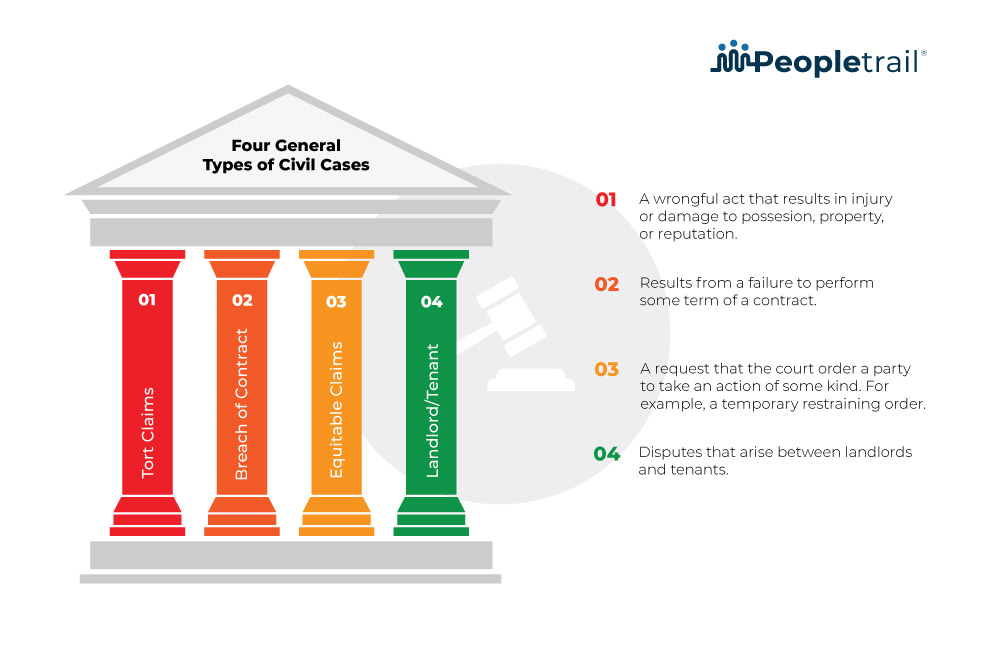When it comes to obtaining court records, there are a number of considerations.
Are records to be retrieved from the civil courts or the criminal courts?… A federal district courthouse or a county courthouse?
The truth is, there is no way to obtain all court information– county and federal; civil and criminal– by searching a single source. There is a fairly clean separation of information depending on the type of court that a given case was processed in– and sources don’t often overlap.
We’ve already discussed the distinctions between federal and county courts in this article. Let’s now clarify the differences between criminal and civil courts.
The Distinction Between County and Civil Cases
Put simply, criminal cases involve the enforcement of public law. When criminal charges are levied against an individual, the government (either state or federal depending on the crime) is the prosecuting body.
Civil cases are conflicts between individuals, groups, or institutions. In the majority of civil cases, one party brings charges (a complaint) against another, seeking damages (typically money) as a means of restitution.
In the United States, criminal and civil courts are completely separate from one another; governed by judges with different powers. Therefore, their respective records are separate and the processes for retrieving them are different.
When is it “most necessary” to search the civil courts?
While criminal records retrieval is a part of most any pre-employment screening program, there are times when a search of the civil courts is highly recommended as well. Here are just a few:
1. Tenant screening
Housing claims are fairly common. Whether the dispute is filed by a tenant against their landlord or a landlord against a tenant, such civil cases can be an indication of an individual’s trustworthiness as a property dweller. Common cases involving landlords and tenants include:
- Failure to pay rent (landlord action)
- Breach of lease (landlord action)
- Damage to property (landlord action)
- Withholding security deposit (tenant action)
- Retaliation (tenant action)
2. You are hiring for a sales, upper management, or executive position
Breach of contract claims are processed by the hundreds of thousands, annually, and come in a number of forms. Most of these claims arise because of the following:
- Failure to complete a project
- Failure to provide timely payment
- Failure to meet project standards
- Failure to meet project timelines
- Failure to observe a non-compete agreement
- Failure to observe any other employment agreement
A sales representative, upper manager, or executive who has been involved in a breach of contract claim (processed in the civil courts) may possibly present risk to an organization.
3. You are making hires within the construction industry
General contractors, project managers, or even trade workers who have had breach of contract claims brought against them, may give their hiring organization a bit of pause– and for good reason. The construction industry sees a considerable amount of civil lawsuits on an annual basis– a good reason to conduct civil screening on new construction hires.
4. You are hiring for any position that involves interaction with children
Many family law matters are processed in the civil courts. Such matters include child support/custody claims, adoptions, and divorce. Additionally, restraining orders take two general forms; criminal and civil. Civil restraining orders are issued to prohibit civil harassment such as stalking or abuse.
When hiring for positions that involve vulnerable parties, organizations will likely want to uncover any active restraining orders or a history of poor treatment of children.
5. You are hiring medical professionals
A large number of medical malpractice claims are processed in the civil courts. When records exist, hiring managers can obtain the details of malpractice cases involving their job candidates, better informing their hiring decisions.
Civil Courts Provide Valuable Insights
In some situations, civil court records aren’t all too relevant to a hiring decision. However, for certain positions in certain industries (such as those mentioned above), civil records can be equally as important as criminal insights– and they won’t be retrieved unless intentionally accounted for. There is no single source of criminal and civil records data. They (in most instances) have to be obtained separately.
We hope you found this article helpful. For more screening insights, feel free to browse our article library.









